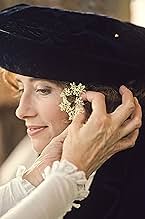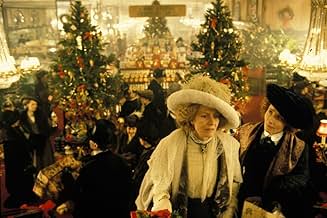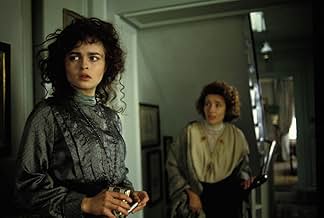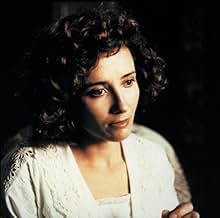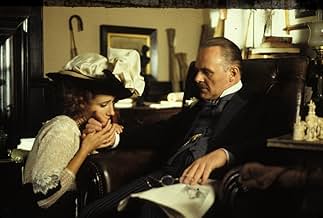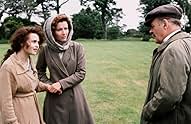IMDb-BEWERTUNG
7,4/10
37.761
IHRE BEWERTUNG
Ein Geschäftsmann vereitelt den Nachlass seiner Frau aus einem Nachlass an eine andere Frau.Ein Geschäftsmann vereitelt den Nachlass seiner Frau aus einem Nachlass an eine andere Frau.Ein Geschäftsmann vereitelt den Nachlass seiner Frau aus einem Nachlass an eine andere Frau.
- Regie
- Drehbuch
- Hauptbesetzung
- 3 Oscars gewonnen
- 32 Gewinne & 49 Nominierungen insgesamt
Empfohlene Bewertungen
10sphinx-7
This is one of my all-time favorite movies. From the opening credits, superimposed over Vanessa Redgrave's skirt sweeping through the wet grass and flowers around Mrs. Wilcox's beloved Howards End, through to the final image of rural bliss, the cinematography is perfection. The costuming is amazing, the screenplay is adept, and the acting is stellar, to say the least. To have Emma Thompson, Helena Bonham Carter, Vanessa Redgrave, and Anthony Hopkins in one movie together is to see a true synthesis of talent, not to mention James Wilby and Samuel West. The scene where Leonard Bast goes walking into the field of blue flowers is breathtaking.
I recommend this film to anyone who loves Forster and who loves painterly cinematography. Also it is full of the finest performances by all of the actors involved.
I recommend this film to anyone who loves Forster and who loves painterly cinematography. Also it is full of the finest performances by all of the actors involved.
The literary period piece is a difficult genre to master, requiring a difficult balancing between restraint and flowing emotion. Few films effectively achieve this as beautifully as Merchant-Ivory's astounding HOWARDS END, making it probably the best period film of the 1990's. The film juxtapositions the intellectual, emotionally unhindered Schlegel sisters against the restrained, imperious Wilcox family, and, for good measure, mixes in the differing attitudes toward class emerging early in the century. What could quite easily have been a dry study in the cultural dynamics of pre-WWI England becomes an enveloping tale, thanks in no small part to the performances by Hopkins, Emma Thompson, and Vanessa Redgrave, whose Ruth Wilcox remains enigmatic after every viewing. The emotions ringing through by film's end - not to mention its astoundingly pointed social criticism - give the film its power, a power missing even from Forster's rambling, distant novel. And this story is nestled amongst some of the most beautiful art direction, music, and cinematography to ever grace the screen. The haunting journey to HOWARDS END is one few other recent films can rival.
...and I must admit that on the first viewing, I didn't get it myself.
I'm one of those relative rarities: a straight male that normally enjoys Merchant-Ivory productions. However, I disliked this movie on first viewing (several years ago). In retrospect, I can see that I was not reacting to the movie, but my intense dislike for Anthony Hopkins' character.
I watched it again the other night and was absolutely blown away by it. What a film! Emma Thompson won Best Actress for her performance, and she did her usual terrific job, but frankly I was more impressed by the performance of Helena Bonham Carter. The style of the film is magnificent.
This is a story (like most of E. M. Forster's) about the injustices of class distinctions. However, with a subtlety that I missed on my first viewing, this film is also about karma (what goes around - comes around) and a story of social progress. This film is set in a time when society is coming out of the Victorian age and into the Edwardian. You see contrasts of the past thinking with the progressive thinking all through the movie. A visual metaphor is repeated over and over: the turning of cranks, whether it be on a new-fangled morse code machine, a vintage car, or the wheels of a mighty locomotive. I believe that this represents both karma and progress, forces which Forster sees as unstoppable as the laws of nature.
This is an incredible story, and an incredible piece of film-making.
I'm one of those relative rarities: a straight male that normally enjoys Merchant-Ivory productions. However, I disliked this movie on first viewing (several years ago). In retrospect, I can see that I was not reacting to the movie, but my intense dislike for Anthony Hopkins' character.
I watched it again the other night and was absolutely blown away by it. What a film! Emma Thompson won Best Actress for her performance, and she did her usual terrific job, but frankly I was more impressed by the performance of Helena Bonham Carter. The style of the film is magnificent.
This is a story (like most of E. M. Forster's) about the injustices of class distinctions. However, with a subtlety that I missed on my first viewing, this film is also about karma (what goes around - comes around) and a story of social progress. This film is set in a time when society is coming out of the Victorian age and into the Edwardian. You see contrasts of the past thinking with the progressive thinking all through the movie. A visual metaphor is repeated over and over: the turning of cranks, whether it be on a new-fangled morse code machine, a vintage car, or the wheels of a mighty locomotive. I believe that this represents both karma and progress, forces which Forster sees as unstoppable as the laws of nature.
This is an incredible story, and an incredible piece of film-making.
Here is another example of what the British are best at in film-making. Based on E.M. Forster's novel `Return to Howards End' this film is more or less a set piece in the strictest period-piece tradition, and thus in style is somewhat akin to that great TV series `Return to Brideshead' and even Robert Altman came up trumps with his splendid `Gosford Park' which most definitely takes its well-earned place alongside such classical pieces of this genre.
Likewise, `Howards End' relies heavily on British actors who have worked their way up through live theatre: it is here that you get the best interpretations, the best performances, admirably shown in so many films made on both sides of the Atlantic. If Vanessa Redgrave has long since been a legend among British actresses, Emma Thompson is no lesser performer, and as to the pedigree of Helena Bonham-Carter there can be no arguing. Anthony Hopkins is at least up to the mark in his always sober readings in these kinds of films.
The Bonham-Carter family were well known in the fashionable circles of 1930's London high-society life, for their extravagant soirées and philanthropic sponsoring of young artists, especially musicians, similarly to the Sitwell family from their Chelsea home. Thus it is hardly surprising that Helena Bonham-Carter finds these kinds of rôles admirably suited to her - A Room with a View, anything Shakespearean, among other select `comedies'. Prunella Scales is a grand old lady of theatre, cinema and television, and I can remember her offerings back in the late fifties-early sixties especially on radio programmes.
Beautifully filmed in mostly Oxfordshire and in several places in London, the film also has a few scenes on the coast, possibly Dorsetshire or more probably the south coast of Devon, surprisingly not included in IMDb's very detailed listing of locations. Richard Robbins' music seemed to be heavily influenced by Philip Glass at times, which seemed a misfit, though it was nice to hear a few snatches by Percy Grainger, as well as a version for four hands on the piano of Beethoven's Fifth Symphony, possibly one of those tremendous transcriptions which Franz Liszt carried out.
The dialogues are mostly exquisitely delivered, with that peculiarly British panache and timing, though slightly spoiled in this recent re-viewing as there were some untimely cuts on the copy in question. However, the story holds its line and is faithful to E.M. Forster's original concept. He has long been one of the greatest of British novelists, with such works as `A Passage to India', `Where Angels Fear to Tread' and `A Room with a View' to his credit, for serious readers of real literature.
This film version maintains that seriousness for people interested in real play-acting.
Likewise, `Howards End' relies heavily on British actors who have worked their way up through live theatre: it is here that you get the best interpretations, the best performances, admirably shown in so many films made on both sides of the Atlantic. If Vanessa Redgrave has long since been a legend among British actresses, Emma Thompson is no lesser performer, and as to the pedigree of Helena Bonham-Carter there can be no arguing. Anthony Hopkins is at least up to the mark in his always sober readings in these kinds of films.
The Bonham-Carter family were well known in the fashionable circles of 1930's London high-society life, for their extravagant soirées and philanthropic sponsoring of young artists, especially musicians, similarly to the Sitwell family from their Chelsea home. Thus it is hardly surprising that Helena Bonham-Carter finds these kinds of rôles admirably suited to her - A Room with a View, anything Shakespearean, among other select `comedies'. Prunella Scales is a grand old lady of theatre, cinema and television, and I can remember her offerings back in the late fifties-early sixties especially on radio programmes.
Beautifully filmed in mostly Oxfordshire and in several places in London, the film also has a few scenes on the coast, possibly Dorsetshire or more probably the south coast of Devon, surprisingly not included in IMDb's very detailed listing of locations. Richard Robbins' music seemed to be heavily influenced by Philip Glass at times, which seemed a misfit, though it was nice to hear a few snatches by Percy Grainger, as well as a version for four hands on the piano of Beethoven's Fifth Symphony, possibly one of those tremendous transcriptions which Franz Liszt carried out.
The dialogues are mostly exquisitely delivered, with that peculiarly British panache and timing, though slightly spoiled in this recent re-viewing as there were some untimely cuts on the copy in question. However, the story holds its line and is faithful to E.M. Forster's original concept. He has long been one of the greatest of British novelists, with such works as `A Passage to India', `Where Angels Fear to Tread' and `A Room with a View' to his credit, for serious readers of real literature.
This film version maintains that seriousness for people interested in real play-acting.
"Howards End" is certainly one of the best films of the last decade. I have seen this film several times over the past 7 years and each time I find myself in complete awe. I love how its intricate story gradually unfolds layer by layer, involving us more and more with the characters. "Howards End" also boasts breath-taking cinematography by Tony Pierce-Roberts and a rousing and rueful musical score by Richard Robbins.
The ensemble cast is perhaps the best reason to see this film. Emma Thompson won the Best Actress Oscar for her performance, and deservedly so! This is her best performance and her best film, in my opinion. I loved watching the character development in her portrayal of Margaret Schlegel, as she transforms from an open-minded intellectual to a class-conscious social climber. What's remarkable is that we still feel for her greatly as she is going through this transition. She still remains a sympathetic character up until the very end when she slowly comes back to her senses.
Anthony Hopkins also gives one of his best performances as the cold and hypocritical Henry Wilcox. So many scenes shed different lights onto his character. The scene where he proposes to Margaret stands out in particular. There is plenty of erotic tension, but at the same time it almost feels like he is making some sort of impersonal business venture with her.
Vanessa Redgrave is a presence to behold as the fragile Ruth Wilcox. Her performance may be brief, but it leaves an indelible mark, particularly in later scenes when Margaret visits Howards End. Helena Bonham Carter should have gotten an Oscar nomination for her performance. She really has great depth and passion that is well-suited to her character. The rest of the supporting cast is superb. Even the minor characters like Nicola Duffet's Jackie Bast and Jemma Redgrave's stony-faced Evie Wilcox are noteworthy.
"Howards End" is one of the richest, most nuanced films I have seen. It is beautifully shot, well-acted, and exquisitely directed. It deserves to be considered a classic.
The ensemble cast is perhaps the best reason to see this film. Emma Thompson won the Best Actress Oscar for her performance, and deservedly so! This is her best performance and her best film, in my opinion. I loved watching the character development in her portrayal of Margaret Schlegel, as she transforms from an open-minded intellectual to a class-conscious social climber. What's remarkable is that we still feel for her greatly as she is going through this transition. She still remains a sympathetic character up until the very end when she slowly comes back to her senses.
Anthony Hopkins also gives one of his best performances as the cold and hypocritical Henry Wilcox. So many scenes shed different lights onto his character. The scene where he proposes to Margaret stands out in particular. There is plenty of erotic tension, but at the same time it almost feels like he is making some sort of impersonal business venture with her.
Vanessa Redgrave is a presence to behold as the fragile Ruth Wilcox. Her performance may be brief, but it leaves an indelible mark, particularly in later scenes when Margaret visits Howards End. Helena Bonham Carter should have gotten an Oscar nomination for her performance. She really has great depth and passion that is well-suited to her character. The rest of the supporting cast is superb. Even the minor characters like Nicola Duffet's Jackie Bast and Jemma Redgrave's stony-faced Evie Wilcox are noteworthy.
"Howards End" is one of the richest, most nuanced films I have seen. It is beautifully shot, well-acted, and exquisitely directed. It deserves to be considered a classic.
Wusstest du schon
- WissenswertesDame Emma Thompson received a total of thirteen nominations for her role in this movie. She won in all of those events, which includes an Oscar, a Golden Globe, and a BAFTA as Best Actress.
- PatzerWhen Charlie and Dolly Wilcox are hiding from Margaret Schlegel in the castle, the scene closes with low angle wide shot of the castle with a view of the sky behind it, revealing an aircraft contrail. There were no aircraft capable of leaving high-altitude contrails in the time period this movie is set in.
- Zitate
Margaret Schlegel: Will you forgive her as you yourself have been forgiven... you have had a mistress; I forgave you. My sister has a lover, you drive her from the house. Why can you not be honest for once in your life? Why can't you say what Helen has done, I have done!
Top-Auswahl
Melde dich zum Bewerten an und greife auf die Watchlist für personalisierte Empfehlungen zu.
- How long is Howards End?Powered by Alexa
Details
- Erscheinungsdatum
- Herkunftsländer
- Offizieller Standort
- Sprachen
- Auch bekannt als
- El fin del juego
- Drehorte
- Fortnum & Mason's, Piccadilly, Mayfair, Westminster, Greater London, England, Vereinigtes Königreich(where Ruth and Margaret do their Christmas shopping)
- Produktionsfirmen
- Weitere beteiligte Unternehmen bei IMDbPro anzeigen
Box Office
- Bruttoertrag in den USA und Kanada
- 26.126.837 $
- Eröffnungswochenende in den USA und in Kanada
- 52.568 $
- 15. März 1992
- Weltweiter Bruttoertrag
- 26.476.514 $
- Laufzeit
- 2 Std. 22 Min.(142 min)
- Farbe
- Seitenverhältnis
- 2.39 : 1
Zu dieser Seite beitragen
Bearbeitung vorschlagen oder fehlenden Inhalt hinzufügen




